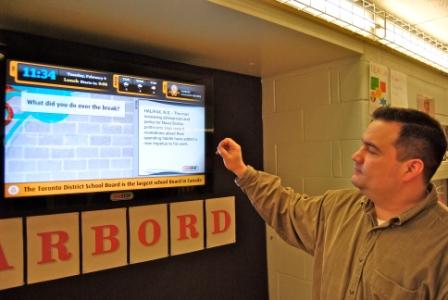By Reem Jazar

March 2010 - Rodrigo Fuentes, Harbord Collegiate's principal, shows off a flatscreen monitor that was a part of a pilot project. Perry King/Gleaner News
The Toronto District School Board is voting on March 9 about bringing video screen ads to as many as 70 Toronto secondary schools. The board is expected to vote in favour of the screens, with some restrictions to commercial advertising.
The TDSB’s committee of administration, finance, and accountability met on March 2 to discuss the proposed idea with the public.
Interested Kensington resident Jonathan Goldsbie, who is opposed to the screens broadcasting advertisements, was very content with the amendments put forward by the trustees.
The main amendment is that there be “no commercial advertisements” allowed on the screens. It is currently not obvious what commercial advertising means in this context.
Ward 16 (Eglinton-Lawrence) trustee Sheila Cary Meagher proposed that the board will clarify the stipulation about commercial advertising, while student trustee Zane Schwartz set out particular criteria as to how a school would approve the screens, and who in the school’s body would vote on it.
“It’s not clear what will happen at the next board meeting, but I was really happy that the trustees that I thought would be more enthusiastic about the proposal are looking at it more carefully, and are being more cautious about how they go ahead with it,” Goldsbie said.
The digital media screens were first tested as a pilot project at four Toronto high schools last year. Central Technical (725 Bathurst St.) and Harbord Collegiate (286 Harbord St.) are two of these four schools. However, Harbord teacher Michael Erickson said at the committee meeting that there were “no real advertisements right now” on the screens at his school.
Rodrigo Fuentes, principal of Harbord Collegiate, said in an interview with the Gleaner that the screens in his school have been effective. “Our students are using them as an educational tool. I can only speak for my school, but here they have been a great success,” he said.
The TDSB said the purpose of the digital screens is to further engage students through posting school events and messages of that nature on the boards, and to generate revenue for the school.
TDSB chair and Ward 10 trustee Chris Bolton could not be reached for comment in time for this story, but Genna Schnurbach, the board’s communications coordinator, said while she understands concerns about advertising, the board has a clear idea as to the objective of the digital media project.
Schnurbach says the results and feedback from the pilot are very promising. “We recently ran a successful, six month pilot project with the screens in four schools and the feedback was very positive from a number of stakeholders. This included parent feedback,” she said.
The school board would have to seek ad sponsorship (running no more than 30 per cent of the time) in order to keep the video screens in schools.
Some people have raised concerns, saying ads have no place in schools. One of the critics of the move is Michael Sims who ran against Bolton in the 2010 trustee election.
Sims said the ad boards were an election issue and he was always opposed to the idea as a parent. “Teenagers get enough ads in their daily diet,” said Sims. “Between their smartphones, iPods, and the Internet, they don’t need to be exposed to any more ads in schools.”
Sims said he has not spoken to a single parent who has been supportive of the media boards being brought into schools. “There really isn’t any benefit. This is a play for the board to make money. It’s a terrible idea and avocation of the school’s responsibilities,” said Sims.
“People can watch these programs at home. They are just forcing children to watch these ads while they are confined in a place they have to be at.”
A group of parents of students from the schools participating in the pilot project prepared a report to evaluate the video screens.
“This is a topic that has some parents saying absolutely no; and other parents saying yes, with strict oversight,” reads the report. “The committee understands that the TDSB has a policy in place for advertising and sponsorships, but it is highly recommended to address this issue separately.”
The parents said advertisements for “nutritional topics” such as from the milk board and egg association would “generally” be okay, as well as advertising from post-secondary institutes.
“I think there is a general concern about the sponsorship content that may be on the screens. What is important to note, however, is that any sponsorship content that would appear on the screens would adhere to our board policies,” said Schnurbach, “which are very specific in terms of what is deemed appropriate messaging for youth.”
Michael Girgis, President and CEO of Onestop Media, said the final decision is left up to the school board. “I’m respecting the process,” said Girgis. “The pilot showed this would be beneficial to students and that’s what we’re in it for.”
With files from Gurpreet Ghag
